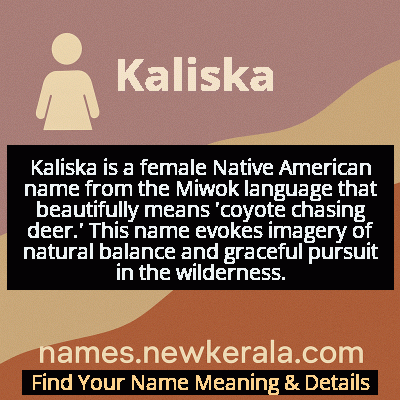Kaliska Name Meaning & Details
Origin, Popularity, Numerology Analysis & Name Meaning of Kaliska
Discover the origin, meaning, and cultural significance of the name KALISKA. Delve into its historical roots and explore the lasting impact it has had on communities and traditions.
Name
Kaliska
Gender
Female
Origin
Native
Lucky Number
1
Meaning of the Name - Kaliska
Kaliska is a female Native American name from the Miwok language that beautifully means 'coyote chasing deer.' This name evokes imagery of natural balance and graceful pursuit in the wilderness.
Kaliska - Complete Numerology Analysis
Your Numerology Number
Based on Pythagorean Numerology System
Ruling Planet
Sun
Positive Nature
Leaders, ambitious, highly driven, self-reliant, innovative.
Negative Traits
Overly aggressive, domineering, impatient, selfish.
Lucky Colours
Red, orange, gold.
Lucky Days
Sunday.
Lucky Stones
Ruby, garnet.
Harmony Numbers
2, 3, 9.
Best Suited Professions
Entrepreneurs, managers, engineers.
What People Like About You
Courage, determination, leadership.
Famous People Named Kaliska
Kaliska Running Deer
Environmental Activist
Founded the Native Waters Protection Alliance to preserve indigenous water rights
Kaliska Morning Star
Educator and Cultural Preservationist
Developed Miwok language revitalization programs in California schools
Kaliska Wind Dancer
Traditional Weaver
Revived traditional Miwok basket weaving techniques and teaches workshops nationwide
Kaliska Little Hawk
Community Health Worker
Established mobile health clinics serving rural Native American communities
Name Variations & International Equivalents
Click on blue names to explore their detailed meanings. Gray names with will be available soon.
Cultural & Historical Significance
Historically, names like Kaliska were given to mark significant events or characteristics observed at birth, often relating to animal behavior or natural phenomena. The coyote holds a prominent place in Miwok mythology as a trickster figure and cultural hero, while deer represent gentleness and sustenance. The combination in Kaliska creates a powerful symbolic narrative that has been passed down through generations, preserving cultural values and environmental wisdom.
In contemporary indigenous communities, names like Kaliska serve as important cultural markers that resist assimilation and celebrate ancestral knowledge. They represent a living connection to tradition while adapting to modern contexts, making them powerful symbols of cultural resilience and identity preservation in the face of historical challenges.
Extended Personality Analysis
Individuals named Kaliska often exhibit a unique blend of strategic thinking and graceful determination. Like the coyote in their name's meaning, they tend to be resourceful, adaptable, and clever problem-solvers who can navigate complex situations with intelligence and wit. They possess a natural curiosity and observational skills that allow them to understand patterns and relationships others might miss.
Simultaneously, the deer aspect of their name's meaning brings qualities of gentleness, sensitivity, and graceful movement through life's challenges. Kaliskas typically demonstrate strong intuition and emotional intelligence, making them excellent mediators and compassionate friends. They often balance ambition with empathy, pursuing their goals while maintaining awareness of how their actions affect others.
This combination creates individuals who are both determined and diplomatic, capable of achieving their objectives through both strength and subtlety. They tend to be natural leaders who inspire loyalty rather than demanding obedience, and they often excel in fields that require both analytical thinking and interpersonal skills. Their inherent understanding of balance makes them particularly effective in roles that bridge different perspectives or communities.
Modern Usage & Popularity
In contemporary times, Kaliska has seen a resurgence as part of the movement to reclaim and celebrate indigenous names. While still relatively uncommon, its usage has grown steadily among Native American families seeking to honor their heritage and among non-native parents drawn to its beautiful sound and ecological meaning. The name appears most frequently in California and the Pacific Northwest, reflecting its Miwok origins, but has spread nationally through cultural appreciation and the popularity of nature-inspired names. Social media and increased awareness of indigenous cultures have contributed to its modern visibility, though it remains distinctive rather than trending toward overuse. Current naming databases show it ranking outside the top 1000 names nationally, maintaining its unique character while gradually gaining recognition as part of the broader appreciation for culturally significant and meaningful names.
Symbolic & Spiritual Meanings
Symbolically, Kaliska represents the dance between pursuit and grace, strategy and intuition. The coyote aspect symbolizes cleverness, adaptability, and the ability to thrive in challenging circumstances, while the deer represents gentleness, awareness, and connection to nature. Together, they create a powerful metaphor for balanced living - the understanding that strength and sensitivity are not opposites but complementary forces. The name also carries deeper symbolism about life's journey, suggesting that success comes not through brute force but through intelligent persistence and harmonious movement with natural rhythms. It embodies the wisdom of knowing when to pursue and when to yield, making it a name rich with philosophical and spiritual significance that speaks to the universal human experience of navigating competing qualities within ourselves and our relationships with the world around us.

